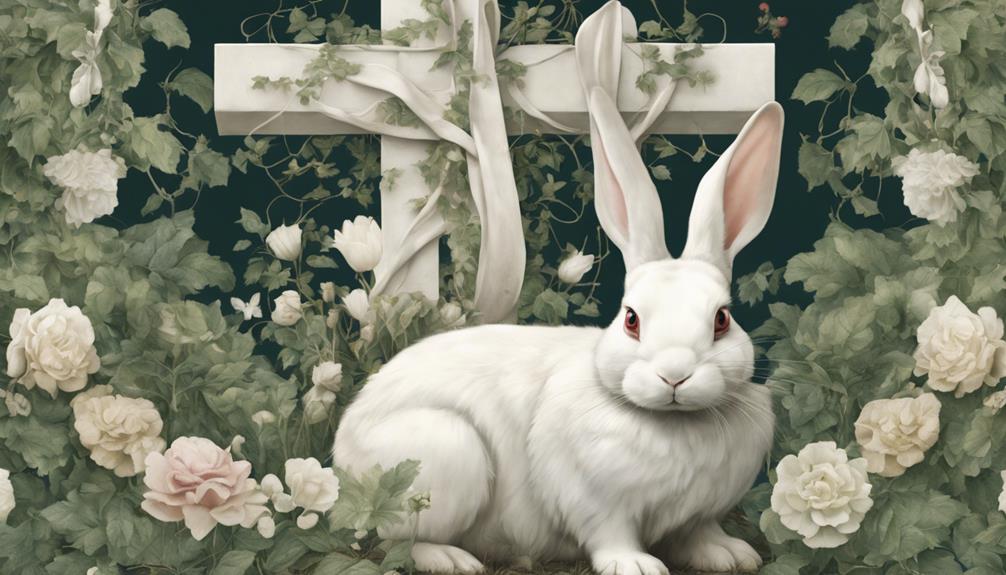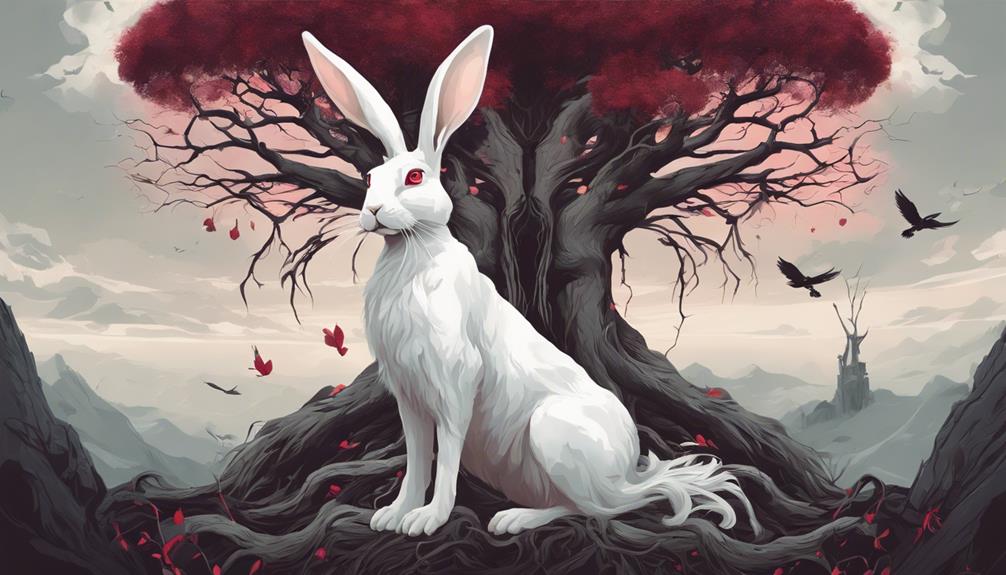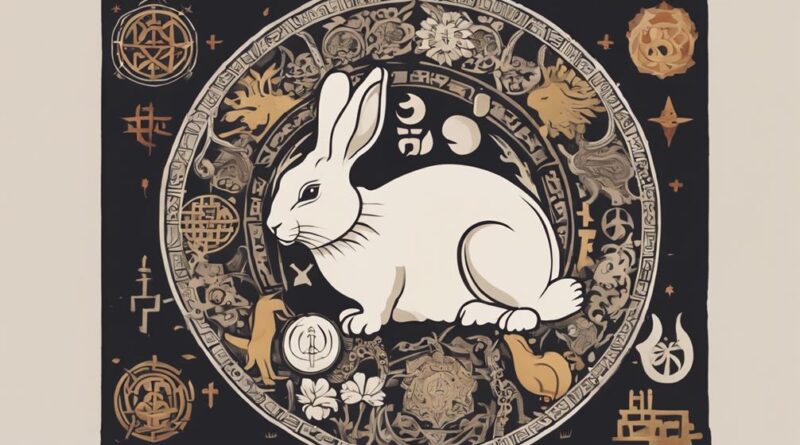Interpreting Rabbit Symbolism in Global Religions
Explore the symbolic depth of rabbits in global religions. In Christianity, they symbolize fertility and renewal. Hinduism ties them to balance and rejuvenation. Norse myths incorporate fertility themes. Buddhism sees them as symbols of agility and compassion. Chinese folklore associates them with cleverness and divinity. African traditions revere their quickness and resourcefulness. Rabbits in Native American faith are messengers of the spirit world, embodying adaptability. Discover how these creatures hold significance in ceremonies and rituals worldwide, embodying ancestral spirits' messages. The rich tapestry of global religions weaves intricate meanings into the symbolism of rabbits.
Rabbits in Christianity

In Christian symbolism, rabbits often represent fertility and rebirth, embodying themes of renewal and new life within the faith. This symbolism can be traced back to biblical references where rabbits aren't explicitly mentioned but where themes of fertility and new life are prevalent. The idea of fertility is deeply embedded in the creation story from the Book of Genesis, where God instructs Adam and Eve to be fruitful and multiply, symbolizing the beginnings of life and growth.
Furthermore, the concept of rebirth is central to Christian belief, particularly in the context of Jesus Christ's resurrection. The resurrection of Jesus is a fundamental doctrine in Christianity, symbolizing the victory of life over death and the promise of eternal life for believers. This theme of resurrection and new life aligns closely with the symbolism of rabbits, as they're often associated with the cycle of life, death, and rebirth.
In Christian art and literature, rabbits are sometimes depicted as companions to saints or as symbols of purity and innocence. The gentle and nurturing nature of rabbits may also be seen as reflecting the caring and compassionate qualities valued in Christian teachings. Overall, the symbolism of rabbits in Christianity serves to reinforce the themes of fertility, rebirth, and the enduring cycle of life within the faith.
Rabbits in Buddhism
Exploring the symbolism of rabbits within Buddhism reveals intricate connections to themes of enlightenment and spiritual growth. In Buddhist teachings, rabbits symbolize various aspects that are deeply intertwined with the core principles of the religion. Here are some key points to consider:
- Buddhist Teachings on Rabbits: Rabbits are often associated with qualities such as agility, fertility, and gentleness in Buddhist teachings. These attributes are seen as essential for spiritual practitioners on their path towards enlightenment. Rabbits' ability to move swiftly and their nurturing nature serve as metaphors for the adeptness and compassion required in one's spiritual journey.
- Symbolism of Rabbits in Buddhist Art: In Buddhist art, rabbits are frequently depicted as companions to Bodhisattvas, enlightened beings who postpone their own entry into Nirvana to assist others in their spiritual growth. This association signifies the importance of companionship and support in the practice of mindfulness and meditation. Rabbits in art serve as reminders of the interconnectedness of all beings and the need for compassion towards others.
- Mindfulness Practices: Rabbits, with their alert and watchful nature, symbolize the practice of mindfulness in Buddhism. Just as rabbits are always attentive to their surroundings, practitioners are encouraged to cultivate present-moment awareness and deep concentration in their spiritual endeavors. The symbolism of rabbits in mindfulness practices underscores the significance of being fully present and engaged in one's spiritual path.
Rabbits in Hinduism
Delve into the intricate symbolism of rabbits within Hinduism to uncover profound connections to spiritual themes and practices. In Hinduism, the rabbit holds significant symbolism and mythological connections, deeply rooted in cultural depictions and spiritual meanings within Hindu beliefs.
The rabbit is associated with the moon in Hindu mythology, symbolizing fertility, rebirth, and rejuvenation. This connection to the moon ties in with the Hindu belief in cycles of life, death, and rebirth. The rabbit's presence in folklore and religious texts often represents agility, cleverness, and the ability to navigate through life's challenges with grace and swiftness.
One of the most famous cultural depictions of a rabbit in Hinduism is found in the epic Ramayana, where the valorous monkey god Hanuman takes the form of a rabbit to assist Lord Rama in his quest to rescue Sita. This story highlights the rabbit's loyalty, sacrifice, and devotion to a higher cause, embodying spiritual virtues highly regarded in Hindu traditions.
Furthermore, the rabbit's association with the moon also signifies the balance between light and darkness, symbolizing the dualities present in the human experience. By embodying qualities of fertility, agility, and loyalty, the rabbit in Hinduism serves as a powerful symbol that enriches the spiritual landscape with its diverse meanings and representations.
Rabbits in Native American Spirituality
Within Native American spirituality, the symbolism of rabbits holds profound significance, intertwining with cultural beliefs and spiritual practices. Rabbits are revered for their symbolic meanings, deeply rooted in the spiritual fabric of Native American traditions.
Here is a closer look at the spiritual and cultural significance of rabbits in Native American spirituality:
- Spiritual Significance: Rabbits are often seen as symbols of fertility and abundance in Native American cultures. Their ability to reproduce quickly and abundantly is associated with the renewal of life and the cycles of nature. Rabbits are also considered messengers that bring guidance and messages from the spirit world to the earthly realm.
- Cultural Symbolism: In Indigenous beliefs, rabbits are often portrayed as clever and resourceful animals. Their agility and quick movements symbolize adaptability and survival skills, qualities highly valued in many Native American tribes. Rabbits are sometimes depicted in stories and folklore as tricksters, teaching important lessons about wit and intelligence.
- Connection to Nature: Rabbits are closely connected to the natural world in Native American spirituality. They symbolize harmony with nature and the interconnectedness of all living beings. By observing the behavior of rabbits in the wild, Native Americans draw lessons about living in balance with the environment and respecting all creatures as vital parts of the earth's ecosystem.
Rabbits in Chinese Folk Religion
In Chinese Folk Religion, the symbolism surrounding rabbits holds significant cultural and spiritual importance, mirroring the reverence seen in Native American spirituality. Rabbits in Chinese folklore connections are often associated with the moon, longevity, and immortality. The rabbit is a prominent figure in the Chinese folklore tale of the Moon Goddess Chang'e, where it's believed to reside on the moon, pounding the elixir of immortality. This connection between rabbits and immortality reflects a similar theme found in Native American beliefs, where rabbits are seen as guides to the afterlife.
The symbolic meanings of rabbits in Chinese Folk Religion go beyond immortality. They're also linked to fertility, agility, and cleverness. The rabbit's ability to procreate quickly is seen as a symbol of fertility and abundance in Chinese culture. Additionally, the agility and cleverness of rabbits are admired traits that are often associated with achieving success in various endeavors.
Moreover, rabbits in Chinese Folk Religion are sometimes depicted as messengers of divine beings, carrying messages between the mortal world and the spiritual realm. This role as messengers highlights the spiritual significance attributed to rabbits in Chinese culture, emphasizing their connection to the supernatural and the unseen world.
Rabbits in African Traditional Religions
Exploring the role of rabbits in African Traditional Religions reveals a rich tapestry of symbolic significance and spiritual connections within the cultural framework. In these religions, rabbits hold a special place in rituals and tribal practices, representing various aspects of life and spirituality.
Here are three key points to help you understand the significance of rabbits in African Traditional Religions:
- Rabbit Symbolism in African Rituals
Rabbits are often seen as symbols of fertility, abundance, and prosperity in African Traditional Religions. They're believed to bring blessings of new life and growth, making them essential figures in ceremonies related to harvest, marriage, and birth.
- Significance of Rabbits in Tribal Practices
Within tribal communities, rabbits are revered for their agility and quickness, traits that are admired and emulated by members of the tribe. Rabbits are also associated with cleverness and resourcefulness, qualities that are valued in facing life's challenges.
- Cultural Representation through Rabbits
Rabbits in African Traditional Religions aren't just seen as animals but as embodiments of ancestral spirits or messengers from the divine realm. Their presence in myths and folklore serves to connect the living with the spiritual world, creating a bridge between the earthly and the supernatural.
In African Traditional Religions, the symbolism of rabbits weaves a narrative of interconnectedness, spirituality, and the cyclical nature of existence, enriching the cultural tapestry of these belief systems.
Rabbits in Norse Mythology

The intricate web of symbolism surrounding rabbits in African Traditional Religions transitions seamlessly into their portrayal in Norse Mythology, where these creatures take on a distinct role in the tales of the Norse pantheon. In Norse folklore, rabbits are often associated with fertility symbolism, mirroring their representation in other cultures as creatures linked to procreation and abundance. Within the context of Norse mythology, rabbits aren't prominent figures like some of the other animal symbols, but they're subtly woven into the fabric of the stories.
In Norse mythology, the trickster archetype is a prevalent motif, embodied by the mischievous god Loki. While rabbits themselves aren't tricksters in Norse tales, they share some characteristics with trickster figures. The quickness and elusiveness of rabbits can be reminiscent of the cunning and unpredictable nature often attributed to tricksters in mythology. This connection suggests that while rabbits may not play a central role in Norse myths, their presence serves to add layers of symbolism and depth to the narratives.
Rabbits in Mesoamerican Religions
How do rabbits symbolize cultural beliefs and values in Mesoamerican religions?
Rabbits held significant symbolism in Mesoamerican cultures, representing various aspects of life and spirituality. Here are three key ways in which rabbits were interpreted within Mesoamerican religions:
- Rabbit Fertility Symbolism:
In Mesoamerican belief systems, rabbits were often associated with fertility and abundance. Their ability to reproduce quickly and in large numbers led to them being seen as symbols of prosperity and growth. Rabbits were linked to the cycles of life, birth, and regeneration, embodying the idea of renewal and new beginnings. Their presence in myths and artwork underscored the importance of fertility in Mesoamerican societies.
- Rabbit Sacrifice Rituals:
Rabbits were also central to sacrificial rituals in Mesoamerican religions. The act of sacrificing a rabbit was believed to appease deities and ensure the fertility of the land. By offering rabbits as sacrifices, people sought blessings for successful harvests and agricultural abundance. These rituals were deeply ingrained in Mesoamerican religious practices, highlighting the interconnectedness between sacrifice, fertility, and spiritual beliefs.
- Symbol of Transformation:
Additionally, rabbits were seen as symbols of transformation and metamorphosis in Mesoamerican cultures. Their ability to burrow underground and emerge into the light symbolized the journey from darkness to light, from ignorance to enlightenment. Rabbits represented the cyclical nature of life, death, and rebirth, emphasizing the interconnectedness of all living beings in the cosmic order.
Frequently Asked Questions
Are There Any Specific Rituals Involving Rabbits in These Religions?
In many global religions, rabbits hold special significance in ritual practices. These rituals often involve the symbolic use of rabbits to convey deeper spiritual connections.
The cultural significance of incorporating rabbits into these ceremonies varies, but they're commonly associated with themes of fertility, rebirth, and abundance.
Understanding the role of rabbits in these rituals can provide insight into the intricate web of beliefs and practices within these diverse religious traditions.
Do Rabbits Have a Symbolic Significance in Other Global Religions?
Rabbits hold significant symbolic meanings in various global religions. Cultural interpretations often depict rabbits as symbols of fertility, abundance, and agility.
In some spiritual practices, rabbits represent rebirth, renewal, and transformation. Folk beliefs associate rabbits with luck, prosperity, and cleverness.
Understanding the spiritual significance of rabbits in different traditions provides insight into the diverse ways they're perceived and valued across various cultures and belief systems.
How Do These Religions View the Relationship Between Humans and Rabbits?
When exploring how various religions perceive the connection between humans and rabbits, intricate layers of symbolism emerge.
The intricate web of interpretations regarding rabbit symbolism in global religions sheds light on the diverse perspectives on the relationship between humans and these creatures.
Delving into these interpretations unveils a rich tapestry of beliefs that offer insights into the spiritual, cultural, and symbolic significance attributed to rabbits in different religious traditions.
Are There Any Myths or Legends That Involve Rabbits in These Belief Systems?
When exploring rabbit folklore and symbolism in various belief systems, you'll find an array of myths and legends that feature these furry creatures. Rabbits often symbolize fertility, abundance, and agility in many cultures.
Myths involving rabbits can range from trickster tales to symbols of rebirth and renewal. By examining these narratives, one gains insight into the diverse roles rabbits play in shaping the spiritual and cultural landscapes across different religions.
How Do These Religions Address the Concept of Rebirth or Regeneration Through Rabbits?
When exploring rebirth symbolism and regeneration rituals in various belief systems, it's fascinating to consider the role of rabbits. These religions often use rabbits as symbols of fertility, renewal, and the cycle of life.
Through myths and legends, rabbits are seen as creatures embodying the concept of rebirth, linking them to themes of regeneration and new beginnings. Their presence in rituals and stories underscores the profound spiritual significance of these small yet powerful animals.
Conclusion
In conclusion, the symbolism of rabbits in global religions is diverse and rich, reflecting themes of fertility, rebirth, abundance, and agility. From Christianity to Buddhism, Hinduism to Native American spirituality, rabbits hold significance as symbols of hope, renewal, and connection to the natural world.
Across various cultures and belief systems, the rabbit serves as a powerful symbol that transcends geographical and religious boundaries, resonating with humanity's universal values and aspirations.
